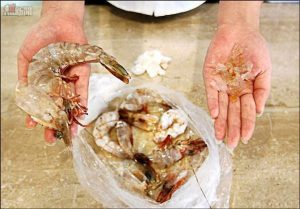Ms. Yang in the southern China port city of Guangzhou bought six high priced giant tiger prawns in October—she was happy with the purchase until she found gel inside the heads of the prawns.
 Juliet Song of NTD writes that such gel, the presence of which is not typically detectable upon superficial inspection, is injected some time between when the shrimp are caught and when they’re sold, in order to add weight and thus earn a greater profit. Shrimp sold live have not been injected, because the injection would kill the shrimp.
Juliet Song of NTD writes that such gel, the presence of which is not typically detectable upon superficial inspection, is injected some time between when the shrimp are caught and when they’re sold, in order to add weight and thus earn a greater profit. Shrimp sold live have not been injected, because the injection would kill the shrimp.
Chinese food authorities have not been particularly active in pursuing the cases brought to their attention, according to interviews and news reports, and there is not even a consensus at which point in the production line the operation takes place.
China is the third-largest exporter of seafood to the United States, and it also exports significant amounts of shrimp and catfish, representing 2 of the 10 most consumed seafood products in the country. Nearly $150 million worth of shrimp were imported from China between January and October 2015, according to data by the U.S. Census Bureau.
The problem of adulterated shrimp has persisted for over a decade, despite new cases regularly reported in the Chinese press. Some of the first well-publicized cases of the gel-injected shrimp appeared in 2005, the same year in which the municipal government of Tianjin launched a strike-hard campaign against shrimp injectors. The report, which referred to the campaign gave no details about how many were arrested, or whether the shrimp adulteration rings were broken.
It is unclear how much, or if any of the gel-injected shrimp make their way to these shores, but food safety experts said there is reason to be concerned. The Food and Drug Administration issued an import alert on Dec. 11, 2015, about the “presence of new animals drugs and/or unsafe food additives” from seafood imported in China, including shrimp.
Wu Wenhui, a professor at Shanghai Ocean University, said in an interview in the Chinese press that customers should be wary about industrial gel ending up in shrimp, given that it’s cheaper than the edible version. “Industrial gel is used for furniture, print, and contains many heavy metals such as lead and mercury, which harms the liver and blood, and is even carcinogenic.”
But the act of injection is itself potentially unsafe.
“Even if what was injected was edible gel, which may not itself be harmful, who can guarantee that the process is aseptic?” said Liu Huiping, a member of the executive council of the Tianjin aquatic products association, in an interview with the Beijing News.










